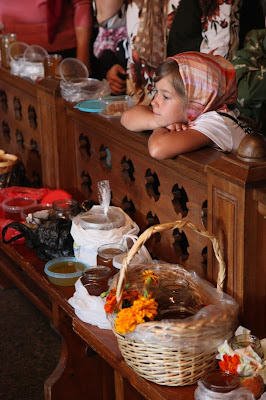 |
| from Fr. Ted's blog |
My parish is lucky enough to have our own vineyard right behind the church. This is very handy on the Feast of Transfiguration; at the end of the liturgy we can process out the doors and around the vineyard, to bless the grapes. It's traditional to bless grapes or apples or any fruit, really, on this day.
Earlier on the feast day morning people brought into the church baskets of fruit and herbs and flowers. I carried a wooden bowl of blueberries and peaches. While we sang and communed and focused on the main event being commemorated, the fruit waited. The incense was particularly sweet that day, and I didn't notice the smell of the beeswax candles as much as I usually do. Though I could see basil in a couple of the baskets, I didn't catch its aroma either.
At the end of the service, with the prescribed prayers for the event, Father L. (and all of us) thanked God for all His bounty, and then he sprinkled holy water over the representative sampling.

He explained to us that this is not a superstitious rite we perform, using holy water to do magic on the fruit. When we bless anything in this way we do not make it into something other than what it is, but ask God to reveal it to be what it has always been.
Whatever created things we are talking about, they have always been
meant by God to bring us into communion with Him. The service of
blessing of fruit brings our thoughts back to Paradise, and the right
and good use of the fruits of the earth that God has given us. We are
reminded of how in the beginning God made Adam and Eve to be stewards
over the Garden of Eden; human beings were called to exercise a loving
and thankful dominion over the earth.
 |
| Russia |
But we by our sin have instead caused destruction on the earth. Mankind
more often than not has overused, abused and consumed in perverse ways
the gifts of the Creator. Personally, I often gobble my food and eat
without attentiveness to Him.
 |
| Russia |
We have prayers for the blessing of bees and beehives and honey, too, usually in a separate service. Around here it’s August 1st, but I found pictures of honey blessings in Bulgaria where they do it dramatically on February 10 (see the bright cross picture down the page).
People like to take pictures of little girls and honey, I was happy to discover, and I am posting some of them here. The Russian ones are from
Optina Monastery, and the Oregon photos from the Facebook page of New Martyrs of Russia Orthodox Church. These honey and bee pictures are so enjoyable that I ended up with way more of them than of fruit.
 |
| Fr. L blessing beehives |
I hope you will hop over to the blog of
Father Ted Bobosh where he posted a large and glorious photo collection of bees and other pollinators, such as the one I put at the very top, along with quotes about bees and Orthodox prayers for them. Just looking at the pictures will likely make you burst into prayer, too. Here is one of the prayers he posted:
 O God, who knows how to work benefits through human labor and irrational living things, You instructed us in your loving-kindness to employ the fruits and works of the bees for our needs. Now humbly we beseech Your majesty: Be pleased to bless the bees and increase them for the profit of the human race, preserving them and making them abundant. Let everyone hoping in Your majesty and Your boundless compassions, and laboring in the care of these living things, be counted worthy to receive abundant fruits of their labors and to be filled with heavenly blessings in Christ Jesus our Lord, to whom is due glory, honor and worship unto ages of ages. Amen.
O God, who knows how to work benefits through human labor and irrational living things, You instructed us in your loving-kindness to employ the fruits and works of the bees for our needs. Now humbly we beseech Your majesty: Be pleased to bless the bees and increase them for the profit of the human race, preserving them and making them abundant. Let everyone hoping in Your majesty and Your boundless compassions, and laboring in the care of these living things, be counted worthy to receive abundant fruits of their labors and to be filled with heavenly blessings in Christ Jesus our Lord, to whom is due glory, honor and worship unto ages of ages. Amen.
The photo at right is from my church on Transfiguration, baskets of all kinds of fruits of the earth waiting for the prayers of blessing. Some of them were inspiring in the variety and arrangement of items, but one of my favorite baskets is the big one in front, full of apples picked just that morning.
 |
| Blessing honey in Bulgaria |
 |
| Honey blessing in Oregon |
I don't eat much honey these days, but I get a whiff of it in the candles every Sunday in church, and I can imagine the heady scent emanating from these tables laden with jars and bowls and plates of honey.
Doesn't it just tell you something about our God, how sweet He is, and how extravagantly generous, that He would give us something as intense and rich as honey?
The bees, of course, are mostly in the business of pollinating the fruit. The whole Creation and its interconnectedness is reflected in the Church and in our salvation history, all of a piece and orchestrated in love by our dear Father God.
 |
| Oregon honeycomb |









.JPG)
.JPG)
.JPG)
.JPG)
.JPG)
.JPG)

.JPG)

.JPG)

.JPG)
.JPG)
.JPG)

.JPG)
.JPG)



.JPG)
.JPG)
.JPG)
.JPG)


crp+GJ+hands2.jpg)



.JPG)



.JPG)












